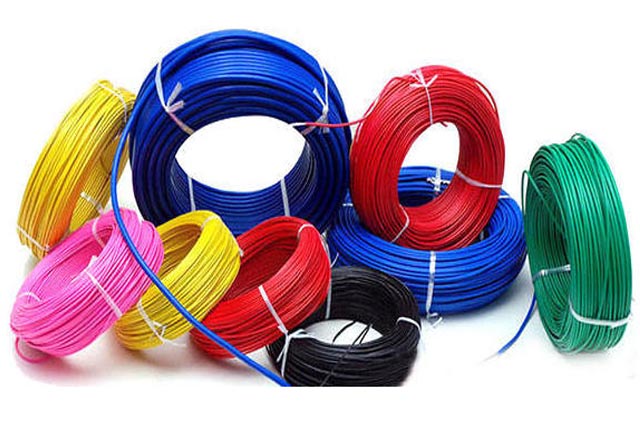PTFE Insulated Wire

PTFE Wire
A wide range of PTFE Wire available in various specifications. These PTFE Insulated Wires possess excellent heat resistant. The specifications are given as: Rating voltage- 300V 1332 Wire temperature range - 0 ~ 200°C 33 wire temperature range - 60 ~ 150°C Conductor - nickel-coated / silver-coated / tin-coated / bare copper.
PTFE insulated wire, also known as Teflon wire, is a type of electrical wire that is widely recognized for its exceptional properties and versatility in various applications. With a history rooted in advanced engineering and material science, PTFE insulation offers unique benefits such as high temperature resistance, chemical inertness, and low friction coefficients. This article delves into the world of PTFE insulated wire, exploring its properties, applications, manufacturing process, and considerations for selection, providing valuable insights into the advantages and considerations associated with this specialized wiring solution. we are international quality ptfe wire manufacturer.
PTFE wire manufacturer
Introduction to PTFE Insulated Wire
What is PTFE Insulation?
PTFE insulation, short for polytetrafluoroethylene, is a type of insulation commonly used in wires and cables. Known for its high performance and durability, PTFE insulation is a popular choice in various industries due to its unique properties.
Properties and Advantages of PTFE Insulation
High Temperature Resistance
One of the key advantages of PTFE insulation is its exceptional resistance to high temperatures, making it suitable for applications where heat resistance is crucial. This property allows PTFE insulated wires to withstand extreme conditions without compromising performance.
Chemical Resistance
PTFE insulation is known for its resistance to a wide range of chemicals, acids, and solvents. This makes it highly desirable in industries where exposure to corrosive substances is common, ensuring the longevity and reliability of the wires in harsh environments.
Low Friction Coefficient
Another notable property of PTFE insulation is its low friction coefficient, which reduces wear and tear on the wire surface. This feature not only enhances the performance and efficiency of the wire but also contributes to its longevity, making it a cost-effective choice in the long run.
Applications of PTFE Insulated Wire
Aerospace Industry
PTFE insulated wires are widely used in the aerospace industry due to their superior performance in high-temperature environments and resistance to harsh chemicals. These wires play a crucial role in ensuring the safe and reliable operation of aircraft systems.
Medical Equipment
In the medical field, PTFE insulated wires are utilized in various medical devices and equipment where precision and reliability are paramount. The chemical resistance and high temperature tolerance of PTFE make it an ideal choice for critical applications in healthcare settings.
Telecommunications
Telecommunication networks rely on PTFE insulated cables for their signal transmission needs. The insulation's durability, low signal loss, and resistance to interference make it a preferred option for ensuring smooth and uninterrupted communication in telecommunication systems.
Comparison with Other Types of Insulation Materials
Silicone Insulation
Compared to silicone insulation, PTFE offers higher temperature resistance and better chemical resistance, making it more suitable for demanding applications where extreme conditions are a concern.
PVC Insulation
While PVC insulation is cost-effective, PTFE insulation surpasses it in terms of temperature resistance, chemical resistance, and longevity, making it a superior choice for applications that require superior performance and durability.
Manufacturing Process of PTFE Insulated Wire
When it comes to the manufacturing process of PTFE insulated wire, the extrusion process takes center stage. This involves pushing the PTFE material through a die to create the wire's insulation. Quality control measures are also crucial during production to ensure the wire meets industry standards and specifications. It is also manufactured through Wrapping process, wrapping of ptfe on conductor.
Extrusion Process
During the extrusion process of PTFE insulated wire, the PTFE material is heated and then forced through a shaping die to form the wire's insulation. This process ensures uniform insulation thickness and quality, making the wire suitable for various applications.
Quality Control Measures
Quality control measures are implemented throughout the manufacturing process of PTFE insulated wire to maintain consistency and reliability. This includes testing the insulation thickness, conductivity, and overall performance of the wire to meet stringent industry standards and customer requirements.
Considerations for Selecting PTFE Insulated Wire
When selecting PTFE insulated wire, it's essential to consider the operating conditions and cost implications to ensure the wire meets your specific needs and budget.
Operating Conditions
Consider the temperature, voltage, and environmental factors in which the PTFE insulated wire will be used. PTFE insulation offers excellent resistance to high temperatures, chemicals, and moisture, making it ideal for demanding applications in industries such as aerospace, automotive, and electronics.
Cost Considerations
While PTFE insulated wire offers superior performance and durability, it's essential to balance its benefits with cost considerations. Evaluate the upfront cost of PTFE wire against its long-term benefits and lifespan to make an informed decision that aligns with your budget and project requirements.
Maintenance and Care of PTFE Insulated Wire
Proper maintenance and care of PTFE insulated wire are essential to ensure its longevity and performance over time. Implementing routine inspections, handling the wire with care, and avoiding excessive bending or twisting can help preserve the integrity of the insulation and prevent damage. In conclusion, PTFE insulated wire stands out as a reliable and efficient solution for various electrical applications, thanks to its remarkable properties and durability. Whether used in aerospace, medical, telecommunications, or other industries, PTFE insulation continues to be a preferred choice for its high performance and reliability. By understanding its benefits and considerations, users can make informed decisions when selecting PTFE insulated wire for their specific needs, ensuring efficient and long-lasting electrical connections.